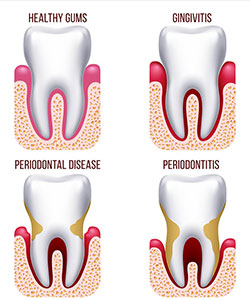
Gum disease is a bacterial infection of the periodontal tissues that surround your teeth. The condition affects millions of Americans, and can be the cause of serious risks to your health if left untreated. In addition to major dental problems that can result from gum disease, it may also elevate the risk of heart disease, stroke, diabetes, and other severe conditions.
Even with regular brushing and flossing, small bits of plaque can still find its way into the gums and cause gingivitis, the least dangerous form of gum disease. Most people will be affected by gingivitis at some point, which is why Dr. Lovda Jr. and our team offer family dentistry options to ensure early treatment is available to stop gum disease from worsening. However, if treatment is not performed in the early stages of gingivitis, more serious gum disease can develop.
The Causes of Gum Disease
Gum disease is typically caused by harmful bacteria invading the gums called biofilm. Biofilm forms when bacteria adheres to surfaces, usually in a warm, wet environment, and begin to excrete a sticky, glue-like substance that sticks to any surface, allowing more and more bacteria to adhere and organize into “colonies.” In sufficient quantities, any of these bacterial colonies can lead to gum disease, starting with mild bleeding and swelling of the gum tissue and progressing to severe bone loss and loosening of the teeth.
Gum Disease Treatment
There is no cure for gum disease; however, there are very effective treatments to stop it from causing more damage and relieve the symptoms. Lovda Family Dental offers advanced techniques to help you address this very common condition.
Lovda Family Dental utilizes advanced diagnostic technologies to precisely and effectively identify periodontal disease and the pathogens causing it. It is these harmful pathogens can put patients at a higher risk of developing periodontal disease. Based on the diagnosis, Dr. Lovda Jr. will determine what type of therapy or antibiotic treatment is best.
When gum disease is present, one of the most frequently performed and effective procedures available at our Hoffman Estates dental office to treat symptoms and prevent it from getting worse is the use of antibiotics in combination with a deep scaling and root planing. This treatment is a non-surgical technique that removes the buildup of plaque and tartar along the teeth and root tissue. Deep scaling and root planing significantly reduces pockets of bacteria and stimulates the healing of the gums.






 Website Powered by Sesame 24-7™
Website Powered by Sesame 24-7™